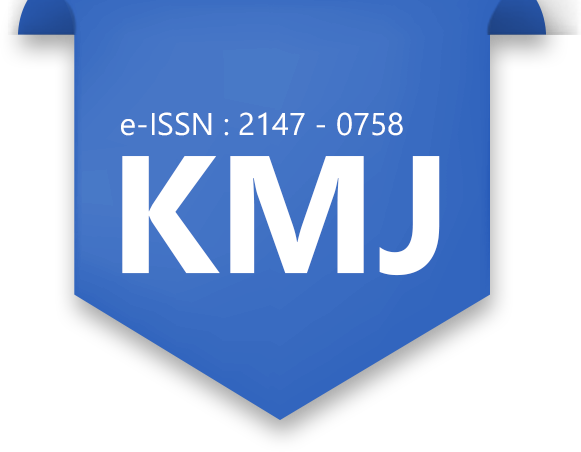
Prognostic Value Of Hemogram Parameters in Stage IV Non-Small Cell Lung Cancer
Ceren Erdoğan Eroğlu1, Dinçer Aydın21Health Science University, Antalya Training and Research Hospital, Department of Endocrinology and Metabolism, Antalya, Türkiye2Kocaeli City Hospital, Department of Medical Oncology, Kocaeli, Türkiye
INTRODUCTION: Determining the prognosis in lung cancer, which is one of the main causes of cancer related deaths, is critical. The cytokine, chemokine and growth factors secreted by inflammatory cells play an important role in tumor progression and metastasis. In this study, it was aimed to investigate the relationship between hemogram parameters affected by inflammation such as hemoglobin level, neutrophil lymphocyte ratio (NLR), platelet lymphocyte ratio (PLR) with overall survival (OS) and progression-free survival (PFS) in patients with stage IV non-small cell lung cancer (NSCLC).
METHODS: The sociodemographic and disease-related clinical features of 212 patients diagnosed with stage IV NSCLC were reviewed retrospectively by scanning the hospital database system and patient files.
RESULTS: In univariate analysis, leukocytosis (>10 000/mm³), neutrophilia (>7700/mm³), lymphopenia (<1000/mm³), thrombocytosis (≥450 000/mm³), high NLR (≥3.38), high PLR (≥138) were associated with poor OS and PFS. In addition, the presence of anemia (hemoglobin <12 g/dL in women,<13 g/dL in men) and low MPV (≤9 fl) were associated with poor OS. In the multivariate analysis, male gender, concomitant coronary artery disease, presence of anemia were independent poor prognostic factors for only OS. Undifferentiated tumor histopathology, adrenal metastasis, monitoring without treatment, anemia and high NLR were independent prognostic factors for both OS and PFS.
DISCUSSION AND CONCLUSION: Hemogram parameters such as NLR and hemoglobin are economic tests that can be repeated and easily measured. these parameters can be used as a useful prognostic marker in clinical practice to determine the prognosis of stage IV NSCLC patients. Larger prospective studies are required to confirm these findings.
Evre IV Küçük Hücreli Dışı Akciğer Kanserinde Hemogram Parametrelerinin Prognostik Değeri
Ceren Erdoğan Eroğlu1, Dinçer Aydın21Sağlık Bilimleri Üniversitesi Antalya Eğitim Ve Araştırma Hastanesi, Endokrinoloji Ve Metabolizma Hastalıkları, Antalya, Türkiye2Kocaeli Şehir Hastanesi, Tıbbi Onkoloji, Kocaeli, Türkiye
GİRİŞ ve AMAÇ: Kansere bağlı ölümlerin başlıca nedenlerinden biri olan akciğer kanserinde, prognozun belirlenmesi kritik öneme sahiptir. İnflamatuar hücrelerin salgıladıkları sitokin, kemokin ve büyüme faktörleri, tümör progresyonu ve metastazında önemli bir rol oynamaktadır. Bu çalışmada evre IV küçük hücreli dışı akciğer kanserli (KHDAK) hastalarda, hemoglobin düzeyi, nötrofil lenfosit oranı (NLO), platelet lenfosit oranı (PLO) gibi inflamasyondan etkilenen hemogram parametrelerinin genel sağkalım (GS) ve progresyonsuz sağkalım (PS) ile ilişkisinin araştırılması amaçlandı.
YÖNTEM ve GEREÇLER: Evre IV KHDAK tanısı alan 212 hastanın sosyodemografik ve hastalığa bağlı klinik özellikleri hastane veri tabanı sistemi ve hasta dosyaları taranarak retrospektif olarak gözden geçirildi.
BULGULAR: Tek değişkenli analizde, lökositoz (>10 000/mm³), nötrofili (> 7700/mm³), lenfopeni (<1000/mm³), trombositoz (≥450 000/mm³), yüksek NLO (≥3.38), yüksek PLO (≥138) kötü GS ve PS ile ilişkili saptanmıştır. Ek olarak anemi varlığı (kadınlarda hemoglobin<12 g/dL, erkeklerde <13 g/dL) ve düşük MPV (≤9 fl) kötü GS ile ilişkili olarak saptanmıştır. Çok değişkenli analizde ise erkek cinsiyet, eşlik eden koroner arter hastalığı varlığı ve anemi varlığı sadece GS için; undiferansiye tümör histopatolojisi, adrenal metastaz varlığı, tedavisiz izlem ve yüksek NLO hem GS hem de PS için bağımsız kötü prognostik faktörler olarak saptandı.
TARTIŞMA ve SONUÇ: NLO ve hemoglobin gibi hemogram parametreleri tekrarlanabilen ve kolayca ölçülebilen ekonomik testlerdir. Bu parametreler evre IV KHDAK hastalarının prognozunu belirlemek için klinik uygulamada yararlı bir prognostik belirteç olarak kullanılabilir. Bu bulguları doğrulamak için daha geniş prospektif çalışmalara ihtiyaç vardır.
Manuscript Language: Turkish












